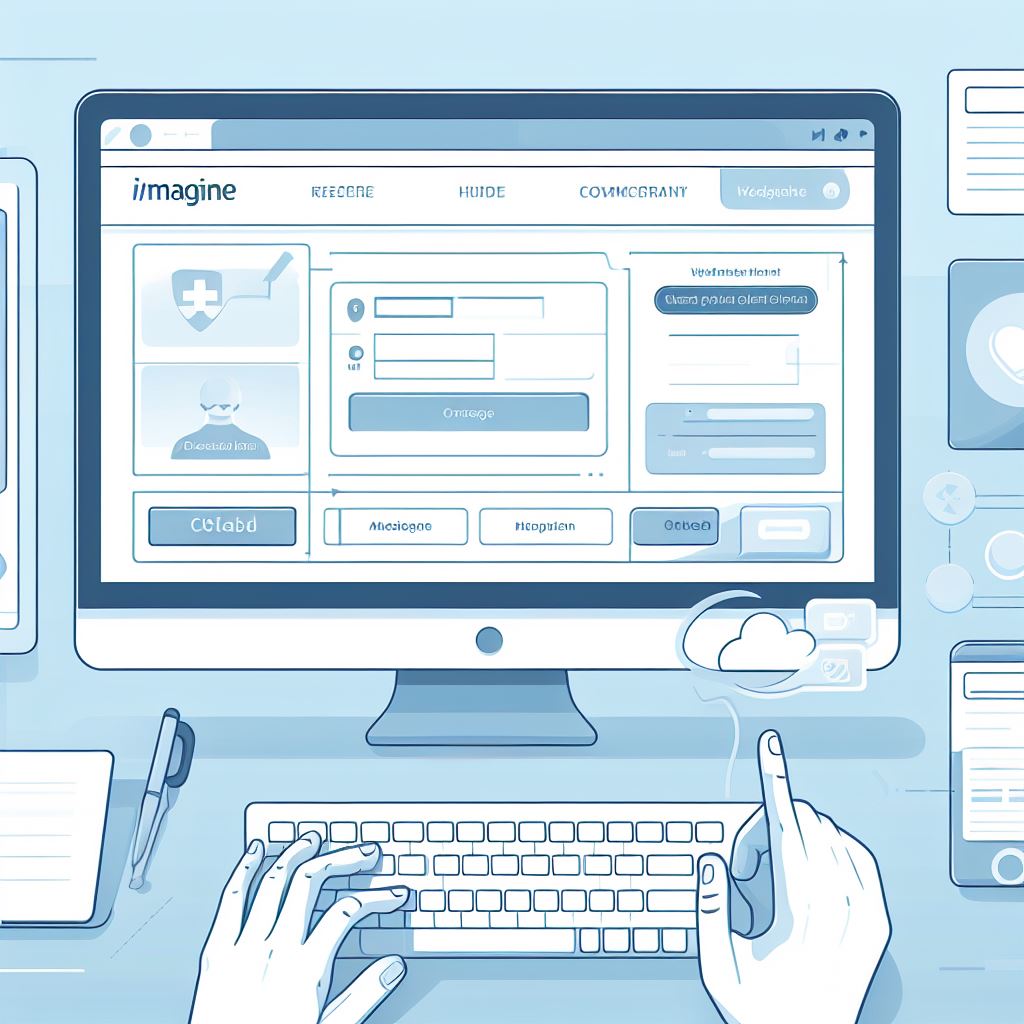13 Easy Steps to Apply for Medicaid Online

Did you know that applying for Medicaid online can save you time and hassle? In just 13 easy steps, you can complete the entire application process from the comfort of your own home.
By gathering the required documents, checking your eligibility, and providing necessary information, you’ll be on your way to accessing essential healthcare services.
This article will guide you through each step, ensuring that you have a smooth and efficient experience applying for Medicaid online.
Key Takeaways
- Gather all required documents, such as proof of identity, citizenship/immigration status, Social Security card/number, and income/household documents.
- Create an account on the state’s Medicaid program website and provide accurate personal information, including name, date of birth, gender, Social Security number, address, contact information, marital status, and dependents’ information.
- Provide detailed information about income and assets, including employment income, self-employment income, unearned income, bank accounts, stocks, real estate properties, vehicles, retirement accounts, and other assets.
- Include information about the household size, income, expenses, assets, and health insurance coverage, as well as provide details about dependents, their healthcare needs, and disabilities.
Gather Required Documents
To ensure a smooth application process, gather all the required documents before proceeding with your Medicaid online application. Having all the necessary paperwork ready will help you avoid delays and make the process much easier for you.
Start by gathering proof of identity, such as a valid driver’s license or passport. You’ll also need to provide proof of citizenship or immigration status, such as a birth certificate or a green card. Make sure to have your Social Security card or number handy as well.
Next, gather documentation regarding your income. This may include recent pay stubs, tax returns, or proof of unemployment benefits. If you receive any other forms of income, such as alimony or child support, have documentation for those as well.
Additionally, you’ll need to provide information about your household, such as the number of people living with you and their relationship to you. This may require documents like birth certificates, marriage certificates, or adoption papers.
Once you have gathered all the required documents, you can proceed with your Medicaid online application knowing that you have everything you need.
Now that you have your documents in order, the next step is to check the eligibility requirements for Medicaid.
Check Eligibility Requirements
Determine your eligibility for Medicaid by reviewing the requirements. Before applying for Medicaid online, it’s important to understand if you meet the eligibility criteria set by the program. Medicaid is a government health insurance program that provides coverage to low-income individuals and families. The eligibility requirements may vary from state to state, but there are some general guidelines to consider.
One of the key factors in determining Medicaid eligibility is income. Each state sets its own income limits, and you’ll need to meet these limits to qualify for coverage. In addition to income, assets such as savings, property, and investments may also be considered when assessing eligibility.
Another requirement to consider is citizenship or immigration status. Generally, U.S. citizens and certain qualified immigrants are eligible for Medicaid. Non-citizens may be eligible for emergency Medicaid or other limited coverage options.
Other factors that may affect eligibility include age, disability status, and household size. Some states also offer Medicaid coverage for pregnant women and children.
Create an Account
To start applying for Medicaid online, create an account using your personal information. This step is crucial as it allows you to securely access the online application portal and track the progress of your application.
Follow these easy steps to create your Medicaid account:
- Visit the official website of your state’s Medicaid program.
- Look for the ‘Create an Account’ or ‘Sign Up’ option on the homepage and click on it.
- Fill out the required fields with accurate information, such as your name, address, date of birth, and contact details.
- Create a unique username and password that you can easily remember but is difficult for others to guess.
- Review and accept the terms and conditions of using the online portal.
Once you have successfully created your account, you can proceed to the next steps of the Medicaid application process. Remember to keep your login credentials in a safe place and refrain from sharing them with anyone to protect the security of your personal information.
Complete Personal Information
Now that you have created your Medicaid account, it’s time to provide your complete personal information. This step is crucial as it allows the Medicaid program to verify your identity and assess your eligibility for benefits. When filling out your personal information, make sure to provide accurate and up-to-date details to avoid any delays or complications in the application process.
Start by entering your full legal name, including your first, middle, and last name. Provide your date of birth, gender, and Social Security number. Medicaid will also require your current address, including the street name, apartment or unit number, city, state, and ZIP code. Additionally, you’ll need to provide your contact information, such as your phone number and email address.
Next, you’ll be asked about your marital status and whether you have any dependents. If you’re married or have children, you’ll need to provide their names, dates of birth, and Social Security numbers as well.
In addition to personal details, Medicaid will also inquire about your employment status, income, and financial resources. Be prepared to provide information about your current occupation, employer, and income sources. You may also need to disclose any assets you own, such as property or investments.
Provide Income Information
Once you have completed your personal information, it’s time for you to provide the necessary details about your income. This step is crucial in determining your eligibility for Medicaid. Here are the key points to consider when providing your income information:
- Employment Income: Include your wages, salary, tips, and any other income you receive from your job.
- Self-Employment Income: If you’re self-employed, report your net income after deducting expenses related to your business.
- Unearned Income: This includes income from sources such as pensions, Social Security benefits, alimony, rental properties, and investments.
- Other Income: If you receive any other forms of income, such as child support or disability benefits, make sure to include them as well.
- Household Income: Provide information about the income of everyone in your household, including your spouse and dependents.
By accurately providing your income information, you’ll help ensure that your Medicaid application is processed correctly and promptly.
Once you have completed this step, you’ll be ready to move on to the next section, which is to submit your asset information.
Submit Asset Information
After providing your income information, it’s time to disclose your assets for your Medicaid application. This step is crucial as it helps determine your eligibility for the program.
When submitting asset information, you need to provide accurate and detailed information about your possessions, investments, and savings.
Start by listing your bank accounts, including checking, savings, and certificates of deposit (CDs). Be sure to include the current balance for each account.
Next, disclose any stocks, bonds, or mutual funds you own. It’s important to provide information about the number of shares you own and their current value.
If you have any real estate properties, such as land or houses, make sure to include their estimated value.
Don’t forget to mention any vehicles you own, including cars, motorcycles, or boats. Provide details such as the make, model, year, and estimated value for each vehicle.
Additionally, disclose any valuable personal items, such as jewelry, artwork, or collectibles, and their estimated worth.
Lastly, provide information about any retirement accounts, such as 401(k)s or IRAs, as well as any other assets you may have, such as trusts or annuities.
It is important to be thorough and accurate when disclosing your assets. Failure to provide complete and truthful information may result in delays or even denials of your Medicaid application.
Enter Household Details
When you have finished submitting your asset information, it’s important to enter the details of your household for your Medicaid application. This step is crucial in determining your eligibility for Medicaid benefits.
Here are the key details you need to provide:
- Household Size: Enter the number of people living in your household, including yourself, your spouse, and any dependents. This information helps determine the income limits for eligibility.
- Income: Provide accurate information about the income of all household members. This includes wages, self-employment earnings, Social Security benefits, pensions, and any other sources of income. Medicaid uses this information to assess your financial situation.
- Expenses: List your monthly expenses, such as rent/mortgage, utilities, childcare, and medical expenses. This helps determine your financial need and eligibility for Medicaid.
- Assets: Include details about any assets you or your household members own, such as property, vehicles, bank accounts, and investments. Medicaid considers these assets when determining eligibility.
- Health Insurance: Specify whether you or any household members have other health insurance coverage. Medicaid takes this into account when assessing your eligibility and benefits.
Include Dependents
Including dependents is a crucial step in applying for Medicaid online. When applying for Medicaid, it’s important to include all the individuals who are dependent on you for financial support. Dependents can include your children, spouse, or any other individuals who rely on you for their medical needs. By including your dependents in the application, you ensure that they’ll also receive the necessary healthcare coverage through Medicaid.
To include dependents in your Medicaid application, you’ll be required to provide their personal information, such as their names, dates of birth, and social security numbers. It’s essential to provide accurate and up-to-date information to avoid any delays or complications in the application process. Additionally, you may be asked to provide proof of your relationship to the dependents, such as birth certificates or marriage certificates.
By including your dependents in the application, you’re ensuring that they receive the healthcare coverage they need. Medicaid is designed to provide assistance to individuals and families who are unable to afford private health insurance. By including your dependents, you’re taking an important step in securing their access to necessary medical services.
After including your dependents, you may be required to answer additional questions about their specific healthcare needs or any disabilities they may have. These questions are important for determining the level of assistance your dependents may require.
Answer Additional Questions
To complete your Medicaid application online, you’ll need to provide answers to additional questions regarding your dependents’ specific healthcare needs or any disabilities they may have. This information is crucial for determining the level of coverage and support your dependents may require. Here are some of the additional questions you may encounter while filling out the application:
- Healthcare Needs: You’ll be asked to provide details about your dependents’ current healthcare needs, such as any ongoing medical conditions or treatments they’re receiving. This information helps Medicaid assess the appropriate level of coverage for their specific requirements.
- Disabilities: If any of your dependents have a disability, you’ll need to disclose this information in the application. Medicaid provides additional support and services for individuals with disabilities, so it’s important to accurately describe their condition and any specific accommodations they may need.
- Income and Assets: Medicaid may inquire about your dependents’ income and assets. This is done to determine their eligibility for certain programs or benefits. Be prepared to provide accurate financial information to ensure a smooth application process.
- Health Insurance Coverage: You’ll be asked if your dependents currently have any other health insurance coverage. This information helps Medicaid coordinate benefits and ensure that your dependents receive appropriate coverage.
- Other Household Members: Medicaid may inquire about other individuals living in your household. This is to determine if there are any additional sources of income or potential coverage options for your dependents.
Review and Verify Information
Now it’s time to ensure the accuracy of the information you provided and review all the details before submitting your Medicaid application online.
The accuracy of the information you provide is crucial in determining your eligibility. During the review process, the Medicaid system will also verify the documents you have submitted to support your application.
This step is important to ensure that all the necessary information is in order and that your application can be processed smoothly.
Information Accuracy Importance
Review and verify the information you have entered to ensure its accuracy when applying for Medicaid online. It’s crucial to double-check all the details you have provided to avoid any potential errors or inconsistencies.
Here are some key reasons why information accuracy is of utmost importance:
- Mistakes in your application can lead to delays in processing or even rejection.
- Accurate information ensures that you receive the appropriate coverage and benefits.
- Inaccurate details may result in incorrect determination of your eligibility.
- Reviewing your information helps you catch any missing or incomplete data.
- Verifying the accuracy of your information ensures a smooth and efficient application process.
Document Verification Process
Ensure the accuracy of your entered information by reviewing and verifying it during the document verification process for your Medicaid application.
Once you have submitted your application online, it will undergo a thorough review by the Medicaid agency. During this process, the agency will verify the information you provided, such as your income, assets, and household size.
They may request additional documents to support your application, such as pay stubs, bank statements, or tax returns. It’s crucial to carefully review all the information you have entered and compare it with the documents you’re submitting.
This will help ensure that there are no discrepancies or errors that could delay or jeopardize your Medicaid eligibility. By taking the time to review and verify your information, you can increase the chances of a successful Medicaid application process.
Submit Application
Begin the process by gathering all necessary documents for your Medicaid application. These documents will help streamline the application process and ensure that you provide all the required information accurately.
Here are the essential documents you’ll need to submit:
- Proof of identity: This can include a driver’s license, passport, or state-issued ID card.
- Proof of income: Provide documentation such as pay stubs, tax returns, or bank statements to verify your income.
- Proof of residency: Submit documents like utility bills, lease agreements, or a mortgage statement to establish your residency.
- Social Security Number: Ensure you have your Social Security card or any official document that displays your SSN.
- Proof of citizenship or immigration status: Prepare documents like a birth certificate, passport, or green card to prove your status.
Once you have gathered these documents, you can move forward with submitting your Medicaid application. Make sure to review all the information you have provided to avoid any errors or omissions that could delay the processing of your application.
Track Application Status
To track the status of your Medicaid application, you can easily check online or contact your local Medicaid office. Checking online is a convenient and efficient way to stay updated on the progress of your application. Most states have an online portal where you can log in with your credentials and access your application status. Once you’re logged in, you can view the current stage of your application, such as whether it’s pending, being reviewed, or has been approved. Additionally, you can often see any documentation that may be required or any updates regarding your eligibility. This allows you to stay informed and take any necessary actions promptly.
If you prefer a more direct approach, contacting your local Medicaid office is another option. They’ll have information on the status of your application and can provide you with updates. You can reach out to them via phone or in person, depending on your preference. When contacting them, be prepared to provide your application reference number or any other identifying information they may request. The Medicaid office staff will then be able to assist you by providing the latest information on your application status.
Follow up With Medicaid Office
To stay updated on the progress of your Medicaid application, continue the process by following up with the Medicaid office. Following up ensures that you’re informed about any additional documentation needed or any updates on the status of your application.
Here are some steps you can take to follow up with the Medicaid office:
- Call the Medicaid office: Reach out to the Medicaid office by phone to inquire about the status of your application. Make sure to have your application number handy for reference.
- Visit the Medicaid office in person: If you prefer face-to-face communication, you can visit the Medicaid office in person. This allows you to speak directly with a representative and get any questions answered.
- Send an email: Email the Medicaid office to inquire about the status of your application. Include your application number and any relevant details to expedite the process.
- Check the Medicaid office website: Visit the Medicaid office’s website to see if they’ve an online portal where you can track your application status. This provides a convenient way to stay updated at your own convenience.
- Contact your caseworker: If you have been assigned a caseworker, reach out to them directly to follow up on your application. They can provide you with personalized updates and assistance.
Following up with the Medicaid office ensures that you’re informed about the progress of your application and helps you take the necessary steps to complete the process smoothly. Stay proactive and don’t hesitate to reach out for clarification or assistance.
Frequently Asked Questions
How Long Does the Medicaid Application Process Typically Take?
The Medicaid application process typically takes a few weeks. You will need to gather necessary documents, complete the online application, and submit it. After that, the Medicaid office will review your application and notify you of their decision.
Can I Apply for Medicaid Online if I Already Have Private Health Insurance?
Yes, you can apply for Medicaid online even if you already have private health insurance. It’s a convenient option that allows you to explore different coverage options and potentially save on healthcare costs.
What Happens if I Make a Mistake on My Medicaid Application?
If you make a mistake on your Medicaid application, it could lead to delays or even a denial of benefits. Be sure to double-check your information before submitting and contact the appropriate agency to correct any errors.
Is There a Deadline to Apply for Medicaid?
You don’t want to miss the deadline to apply for Medicaid! It’s crucial to submit your application on time. Remember, there are consequences for not meeting the deadline. Don’t delay, take action now!
Can I Apply for Medicaid Online if I Am Not a U.S. Citizen?
Yes, you can apply for Medicaid online even if you are not a U.S. citizen. The online application process allows individuals of various citizenship statuses to apply for Medicaid benefits easily and conveniently.



